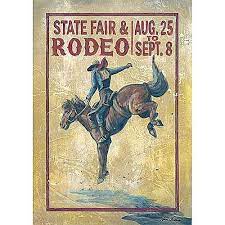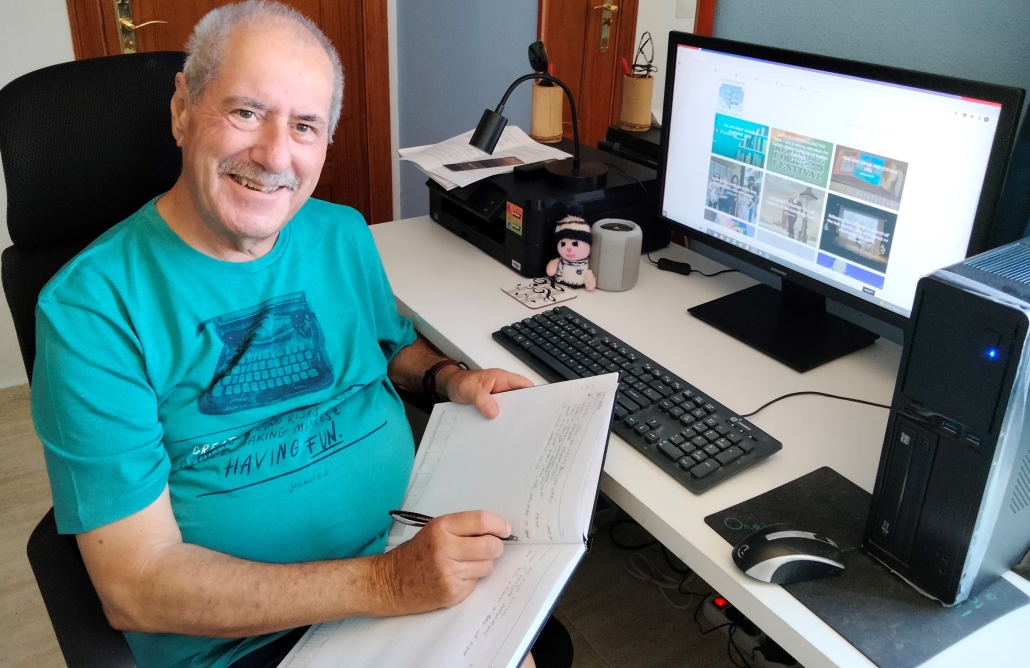TALKING THE LATE JOHN PRINE
TALKING THE LATE JOHN PRINE ´
by Norman Warwick

There are few song lines as sweet and solid as Make me an angel / that flies from Montgomery, although the song Angel From Montgomery also includes another half dozen lines that are up there right beside it. What was it about a poster from an old rodeo? (see left)

Indeed, John Prine was one of the greatest American songwriters the world has seen. Prine, who was born in 1946 in Maywood, Illinois, and passed away in 2020 at 73 years old, due to complications with COVID-19, will live forever in the collective memories of music fans. His songs have been, and will continue to be be covered….. long into the next millennium. it’s fair to say.
His words outside of song were strongly resonant, too, and anyone who knew him thought him to be both a profound and a prosaic conversationalist. He peppered his talking with his thoughts on death, life, and the craft of music. He was a conveyor belt of usable quotes.
On the subject of death, he once told an interviewer that ´I guess I just process death differently than some folks. Realizing you’re not going to see that person again is always the most difficult part about it. But that feeling settles, and then you are glad you had that person in your life, and then the happiness and the sadness get all swirled up inside you´.

He was insightful whenever he talked about the music business of the part he played in it and has been quoted as saying, ´I don’t concern myself with where I fit in. I just keep my head down and keep doing whatever it is I’m going. I’m kind of like the Lone Ranger (left) or Batman. I can just go to my mansion and jump out in my uniform and sing on weekends´.
´As far as my guitar picking, if I make the same mistakes at the same time every gig, people will start calling it a style´, he continued in a phrase that was perhaps referencing critics as much as fans. ´It was always difficult for me to listen to my singing voice for the first 20 years or so. I mean, I really enjoyed singing, and I enjoyed doing live shows, but being in a recording studio and having to hear my voice played back to me would really drive me up the wall´.
And going back to the critics, he once admitted that ´If parts of the review are true, those are the parts that sting´.

Perhaps his opinion of his own vocals explain why he so often duetted on his recordings, with the likes of Iris De Ment (right). He had other reasons as well and once said that ´I think the best duets are those where there’s a dialogue back and forth, and then the two singers go into a thing together´.
Explaining the frequent use of humour in his songs, he told a reporter that ´If I can make myself laugh about something that I should be crying about, that’s pretty good´.
´I guess what I have always found funny is the human condition. There is a certain comedy and pathos to trouble and accidents. Like, when a driver has parked his car crookedly and then wonders why he has the bad luck of being hit´.
That Prine was such a vibrant and vivid speaker was perhaps because he was such a good listener ! He fully drank in the stories he himself was told.
´If you listen to people talk when people actually talk, they talk in melodies. If they get angry, their voice rises, and it’s more of a staccato thing. When they ask for something, they’re real sweet. It’s all music. I just like a good, sad song. The sadder, the better. It moves me´.
Of the hundreds of singer-writers I have been privileged to interview, very few indeed have seemed keen to examine the muse, or their methodology. Most, like the afore-mentioned Iris De Ment prefer to ¨Let The Mystery Be´.
I was never fortunate enough to meet John Prine, though I saw him in concert a few times and read up on him whenever I could. Some of what I read suggested he, too, didn´t want to poke and prod at what he seemed able to achieve through inate ability.
´I could never teach a class on song-writing´, I read somewhere. ´I’d tell them to goof off and find a good hideout´.
He perhaps best revealed his reluctance to examine the muse when he said . “Ignorance is bliss as a writer, I think. Writing is about a blank piece of paper and leaving out what’s not supposed to be there´.
´I think if you write from your own gut, you’ll come up with something interesting, whereas if you sit around guessing what people want, you end up with the kind of same schlock that everybody else has got´.
None of that should not be taken to suggest John Prine took music lightly, however, as he explained by saying ´Soon as I could play one guitar chord and laid my ear upon that wood, I was gone. My soul was sold. Music was everything from then on. I embraced loneliness as a kid. I know what loneliness is. When you’re at the end of your rope. I never forget those feelings. Man, I hated school. I’d stare at the buttons on the teacher’s shirt the whole class´.
Nevertheless that reluctant student went on to create some of the greatest poetry in Americana music. His songs are littered with conversational dialogue and have a remarkable sense of characterisation.
´I always had an affinity for older people´, he once remembered. ´I had a job delivering newspapers, and one place I had to go was an old people’s home. Some people would introduce you to their neighbours as if you were a nephew or grandson. They didn’t get many visitors, so they acted like you were coming to see them. And that stuck with me for a long time´.
An eye for the minutia of life informed his writing and his understanding of the people who spoke to him had him writing observant lines like ´How the hell can a person go to work in the morning and come home in the evening and have nothing to say?´
It might be argued that some of his songs were produced almost in partnership with almost the entire population of his country.
He once admitted that he was ´fascinated by America…it’s so odd´ and when that line is put together with yet another John Prine quote we perhaps are given our clearest insight into how he worked.
´I think the more the listener can contribute to the song, the better; the more they become part of the song, and they fill in the blanks. Rather than tell them everything, you save your details for things that exist. Like what color the ashtray is. How far away the doorway was. So when you’re talking about intangible things like emotions, the listener can fill in the blanks and you just draw the foundation´.
He was sanguine, it seemed, even about how the entertainment industry worked.
´I’ll go to the movies and hear ‘Angel From Montgomery’ in some film, and nobody ever even told me about it. They don’t tell you your stuff is going to be in a movie. They don’t have to, so they don’t tell you. You get paid,…. eventually.”
In case we think John Prine bore any resentment of that kind of treatment and of having the control of his own product usurped by others he reminded us when he replied in the voice of Dear Abby to a fictional correspondent of low and fragile self-esteem.
“Bewildered, bewildered, you have no complaint. You are what you are, and you ain’t what you ain’t.”

Dear Abby was the most syndicated ´agony aunt´ column in the world (left).

Penned, in fact, by Abigail Van Buren, (right) the column still addresses not only marital problems and issues of social etiquette but also topics such as addiction, covid 19, ageing and death.
And while Dear Abby is still peddling common sense advice down here in earth, John Prine might still be penning pithy songs on the same subjects even up there in Heaven,…..with a pretty damned good choir joining in on the chorus.
Because, as Tina Benitez Eves reminds us again, writing the story behind the song Please Don´t Bury Me for American Songwriter, John Prine was always profound in the plain speaking of both his conversation and his songs. His lyrics to Please Don’t Bury Me, she suggests, tell of John Prine anticipating his own death by singing his own words
Off Prine’s 1973 album Sweet Revenge, the story, and lyrics are all the more poignant now, following the death of the singer and songwriter in 2020, but addressing death and the afterlife was no new subject for Prine, who later penned the “He Was In Heaven Before He Died,” off his fourth album Common Sense in 1975, a song inspired by the death of his father four years earlier, or the many mortal recollections on his final album Tree of Forgiveness (2018), inspired by his surviving cancer in 1998 and again in 2013.
Not as somber as these subsequent songs, when Prine originally wrote the song at the age of 27, there was some more levity behind the more toe-tapping song. “Don’t Bury Me” offered another picture of the end and his “That song was originally about this character I had in mind called Tom Brewster,” said Prine. “He dies but he wasn’t supposed to, like that scene in those old movies. The angels have to send him back, but they can’t the way he is. So they send him back as a rooster, which is why his name is Brewster.”
Prine added, “I ended up trashing that whole part and came up with this idea of the guy just giving all of his organs away, and I made a whole song out of that. It’s the best organ donor campfire song I know of.”
Pondering his idea of the afterlife, Prine sets the scene of his own fabricated demise right from the start.

Woke up this morning
Put on my slippers
Walked in the kitchen and died
And oh what a feeling!
When my soul went through the ceiling
And on up into heaven I did ride
When I got there they did say
John, it happened this way
You slipped upon the floor
And hit your head
And all the angels say
Just before you passed away
These were the very last words
That you said
Please don’t bury me
Down in the cold cold ground
No, I’d rather have ’em cut me up
And pass me all around
Throw my brain in a hurricane
And the blind can have my eyes
And the deaf can take both of my ears
If they don’t mind the size
Sweet Revenge (left) was produced by Arif Mardin and was mostly recorded at Quadraphonic Sound Studios in Nashville. As Prine biographer Eddie Huffman observes, Sweet Revenge was a full-band LP recorded in Tennessee, but the singer had grown dramatically as a vocalist and recording artist over the previous two years. ´He sounded fully integrated with the backing musicians this go-around…´] Two songs, Blue Umbrella and Onomatopoeia, were recorded at Atlantic Recording Studios in New York City while Dear Abby was cut live at a gig at New York’s State University in New Paltz. Dear Abby was attempted in the studio but, as Prine told David Fricke in 1993, “The studio version of that was cut with a band, and it was real stiff and humourless. We cut it once, live, and that was it. That was the power of the song, in the way people would turn their heads the minute I’d get to the first verse, the first chords. That was the reason we used the live version.”
The album features many of the same musicians who played on Prine’s debut album, along with Cissy Houston, who was a member of the Elvis Presley accompaniment group, the Sweet Inspirations, and Houston, Deidre Tuck, and Judy Clay sing with Prine on the title track’s call-and-response.
Sweet Revenge quotes a line from Hunter S. Thompson‘s Fear and Loathing on the Campaign Trail and reflects some of Prine’s frustrations with how his second album was received, commenting in the Great Days: The John Prine Anthology liner notes, “I’d quit my job at the post office, I had this album out that got incredible reviews, and then this second one where the critics started to hit me. I think it got under my skin.”
In the liner notes to John Prine Live, Prine writes that Mexican Home was partially inspired by his father Bill sitting on his front porch in Maywood, Illinois, while Grandpa Was A Carpenter was his homage to his grandfather Empson Schobie Prine. Christmas In Prison mixed humour with pathos, romantic longing with some of Prine’s most cinematic imagery to date. In the Great Days liner notes, Prine writes of the tune, “It’s about a person being somewhere like a prison, in a situation they don’t want to be in. And wishing they were somewhere else. But I used all the imagery as if it were an actual prison, with the lights swinging around the yard, the food tasting bad, making guns out of wood or soap. And being a sentimental guy, I put it at Christmas.”
Please Don’t Bury Me was a rollicking country toe-tapper with some intricate guitar interplay but had been redrafted, with Prine recalling in Great Days, “That song was originally about this character I had in mind called Tom Brewster. He dies but he wasn’t suppose [sic] to, like that scene in those old movies. The angels have to send him back, but they can’t the way he is. So they send him back as a rooster. Which is why his name is Brewster. I ended up trashing that whole part and came up with this idea of the guy just giving all of his organs away, and I made a whole song out of that.”
The album cover is a far cry from the somewhat naive portraits of the singer on his first two LPs: a bearded, denim-clad Prine – wearing sunglasses and pointy-toed cowboy boots, a cigarette jutting from his lips – sprawls across the leather front seats of a 1959 Porsche convertible, the “first toy” the singer purchased with his record company money.

The prime source for this article was a piece by Tina Benitez-Eves for American Songwriter. Check out the magazine on line for scores of similar thought-provoking work.
In our occasional re-postings Sidetracks And Detours are confident that we are not only sharing with our readers excellent articles written by experts but that we are also pointing to informed and informative sites readers will re-visit time and again. Of course, we feel sure our readers will also return to our daily not-for-profit blog knowing that we seek to provide core original material whilst sometimes spotlighting the best pieces from elsewhere, as we engage with new genres and practitioners along all the sidetracks & detours we take.

This article was collated by Norman Warwick, a weekly columnist with Lanzarote Information and owner and editor of this daily blog at Sidetracks And Detours.
Norman has also been a long serving broadcaster, co-presenting the weekly all across the arts programme on Crescent Community Radio for many years with Steve Bewick, and his own show on Sherwood Community Radio. He has been a regular guest on BBC Radio Manchester, BBC Radio Lancashire, BBC Radio Merseyside and BBC Radio Four.
As a published author and poet Norman was a founder member of Lendanear Music, with Colin Lever and Just Poets with Pam McKee, Touchstones Creative Writing Group (for which he was creative writing facilitator for a number of years) with Val Chadwick and all across the arts with Robin Parker.
From Monday to Friday, you will find a daily post here at Sidetracks And Detours and, should you be looking for good reading, over the weekend you can visit our massive but easy to navigate archives of over 500 articles.

The purpose of this daily not-for-profit blog is to deliver news, previews, interviews and reviews from all across the arts to die-hard fans and non- traditional audiences around the world. We are therefore always delighted to receive your own articles here at Sidetracks And Detours. So if you have a favourite artist, event, or venue that you would like to tell us more about just drop a Word document attachment to me at normanwarwick55@gmail.com with a couple of appropriate photographs in a zip folder if you wish. Being a not-for-profit organisation we unfortunately cannot pay you but we will always fully attribute any pieces we publish. You therefore might also. like to include a brief autobiography and photograph of yourself in your submission.
We look forward to hearing from you.
Sidetracks And Detours is seeking to join the synergy of organisations that support the arts of whatever genre. We are therefore grateful to all those share information to reach as wide and diverse an audience as possible.
correspondents Michael Higgins
Steve Bewick
Gary Heywood Everett
Steve Cooke
Susana Fondon
Graham Marshall
Peter Pearson
Catherine Smith
Aj The Dj Hendry
Hot Biscuits Jazz Radio www.fc-radio.co.uk
AllMusic https://www.allmusic.com
feedspot https://www.feedspot.com/?_src=folder
Jazz In Reading https://www.jazzinreading.com
Jazziz https://www.jazziz.com
Ribble Valley Jazz & Blues https://rvjazzandblues.co.uk
Rob Adams Music That´s Going Places
Lanzarote Information https://lanzaroteinformation.co.uk
all across the arts www.allacrossthearts.co.uk
Rochdale Music Society rochdalemusicsociety.org
Lendanear www.lendanearmusic
Agenda Cultura Lanzarote
Larry Yaskiel – writer
The Lanzarote Art Gallery https://lanzaroteartgallery.com
Goodreads https://www.goodreads.
groundup music HOME | GroundUP Music
Maverick https://maverick-country.com
Joni Mitchell newsletter
passenger newsletter
paste mail ins
sheku kanneh mason newsletter
songfacts en.wikipedia.org/wiki/SongFacts




Leave a Reply
Want to join the discussion?Feel free to contribute!